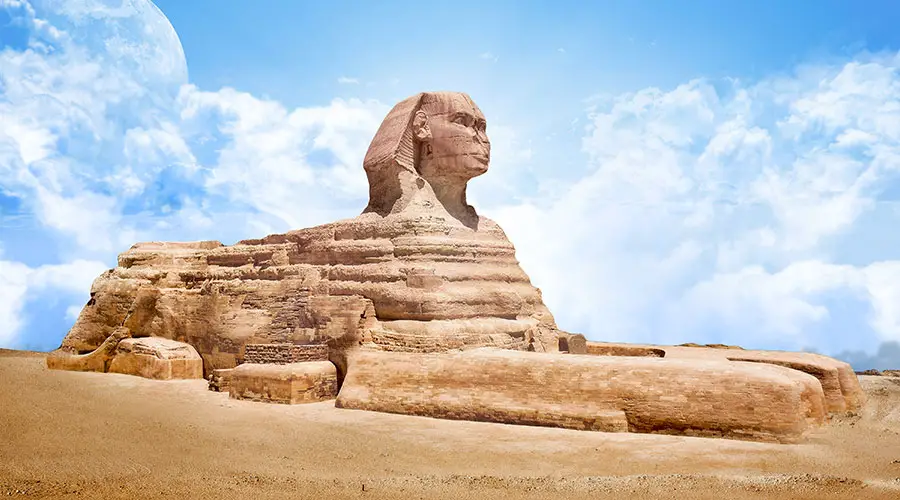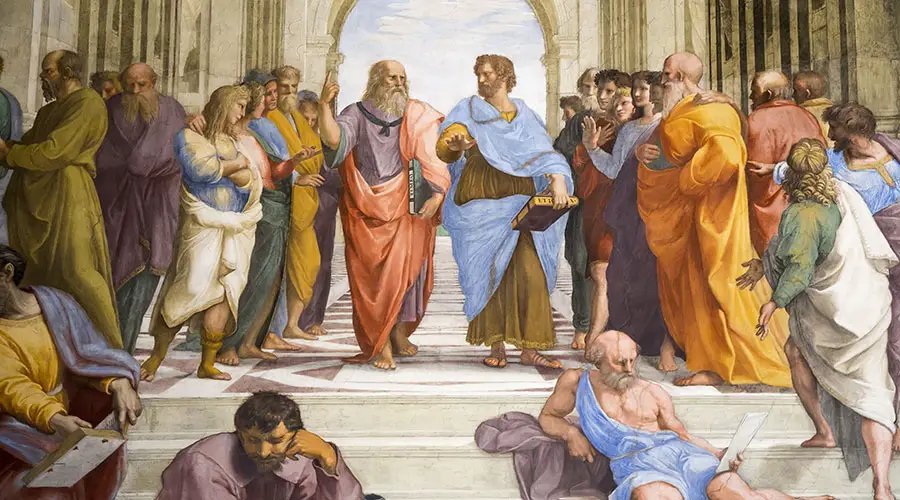Plato the ancient Greek philosopher is considered one of the most important and influential people in history. In this article, we are going to look at the question: what did Plato invent?
Plato invented many ideas in philosophy that are the foundation of western thinking. His ideas on politics, justice, and the soul that are perhaps the most influential in history. In his book The Republic, Plato described how a society should be governed, based on goodness and the human soul.

Plato’s most famous theory is the Theory of Forms
In Theory of Forms, Plato described our world as consisting of two different realms. There is the physical realm in which we live, and then there is the realm of forms which is timeless and absolute. All forms in the realm of forms are based on the ultimate form, which is goodness. He believed that because our physical realm is an inferior copy of the realm of spheres, we can never truly know the essence of something, which resides in its perfect form in the realm of spheres. The Theory of Forms as well as Plato’s ideas about politics and justice continue to be highly influential in modern day life, which you can read about here.
Plato’s most famous book is The Republic
Plato wrote his most famous book in 375 BC. It is a Socratic dialogue, which means that it is structured as a series of questions and answers. It describes what Plato believed to be the ideal system of governing a city state, so that all members of society can live in harmony. He believed in three types of people, just like there are three parts to the human soul. Some people are producers such as farmers, while others are military leaders, and the smallest group is the scholars and politicians. In The Republic Plato wrote many of the ideas of justice and politics that still exist today.
Plato lived in Athens Greece from 427 – 347 BC
Though Plato spent part of his life travelling, most of his life was spent in Athens, Greece. He returned home after being disgusted by the decadent lifestyles he saw elsewhere. Athens was both where he was both born and died. Allegedly he died on the same day he was born, in his sleep at the age of 81. Today, Athens is still the capital city of Greece.

Plato came from a wealthy and influential family
Plato’s mother family was well-connected politically, with close ties to Solon, one of the seven sages, a group of renowned wise men. Plato’s father’s family descended from the king of Athens, named Codrus, who was believed to be a descended of the deity Poseidon.
Plato served in the Peloponnesian War as youth
As a youth, Plato excelled in in his studies, and was a wrestler. He was born during the Peloponnesian war, which was fought between Athens and Sparta between 431 – 405 BC, and he served in the army between 409 and 404 BC.
Plato spent twelve years travelling Egypt, and North Africa
After the death of Socrates, Plato left Athens and for twelve years he travelled and studied science, math, and philosophy. He eventually returned to Greece and founded his school. He was not the first Greek philosopher to study in Egypt, as Pythagoras, who died 70 years before Plato was born, also studied in Egypt, spending 22 years there. Apparently, Pythagoras learned to speak Egyptian from the Pharaoh, and studied with Egyptian priests.

Plato was mentored by Socrates
Socrates was widely regarded as a philosopher in Athens while Plato was still a child, and Plato became a student of Socrates as a very young man. Because Socrates never wrote anything, Most of what we know about Socrates is because of Plato, who produced a series of books on Socrates. Eventually Socrates was forced to drink hemlock for corrupting the youth, when he became considered a threat to the establishment.

Plato wrote in dialogue form
Plato preferred to express his ideas by having characters discuss them in his writing. For example, in his book the Phaedo, Plato presents his theories as dialogues between the characters, which include Socrates, Simmias, Cebes, and the narrator Phaedo.
Plato described the lost civilization of Atlantis
In a series of two Socratic dialogues called Timaeus and Critias, both written in 363 B.C, Plato described the lost civilization of Atlantis. According to Plato, Atlantis existed 9000 years before his time, and he described it as being highly technically evolved. According to Plato, Atlantis was destroyed in a series of natural disasters. You can read more about Plato and Atlantis here.

Plato founded the Academy
The Academy is often regarded as the world’s first school, which Plato created in 387 BC. It was a formal institution dedicated to the study of philosophy, math, and science. It continued to exist for generations after the death of Plato, and produced many other famous philosophers. Most notably, Aristotle. The Academy existed until 86 BC until it was destroyed by the Roman dictator Sulla. Laying siege to Athen, and eventually conquering the city, Sulla’s army caused extensive damage to not only the Academy but much of the city. Some of the philosophers from the Academy were able to continue after the war, but the Academy is too damaged to continue, and they moved to other locations in Athens.
Plato taught Aristotle
Along with Socrates and Plato, the other most famous Greek philosopher was Aristotle. He was part of the first generation who studied directly with Plato at the Academy, and became the school’s greatest student. After studying there for 20 years, Aristotle went on to creating his own school. He produced more written work than Plato, and is regarded as the world’s first scientist, because of the empirical approach he used in his approach to philosophy. Plato was followed by many different schools of philosophy, includes the Skeptics and the Stoics, which can read more about here.

While the word invention is usually use to describe the creation of a device or gadget, Plato’s ideas were so ground-breaking that you could say he was inventing whole new ways of thinking. His innovations in human philosophy are an integral part of the human experience and he will probably continue to be studied for generations to come.
Recommended Reading
If you want to continue exploring this subject more deeply, you can see which books I recommend by clicking here.

